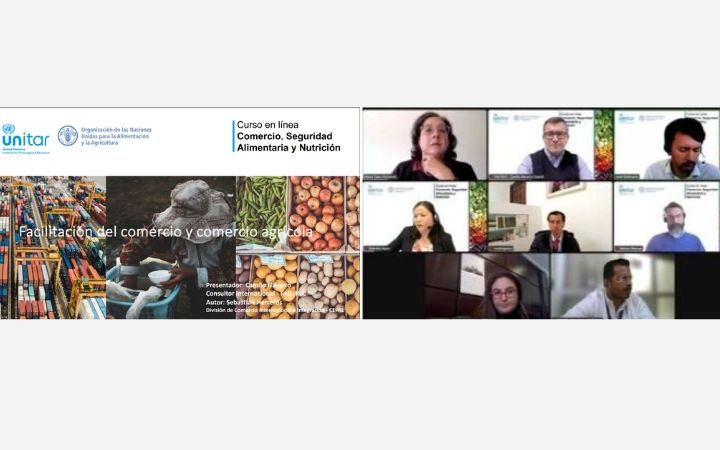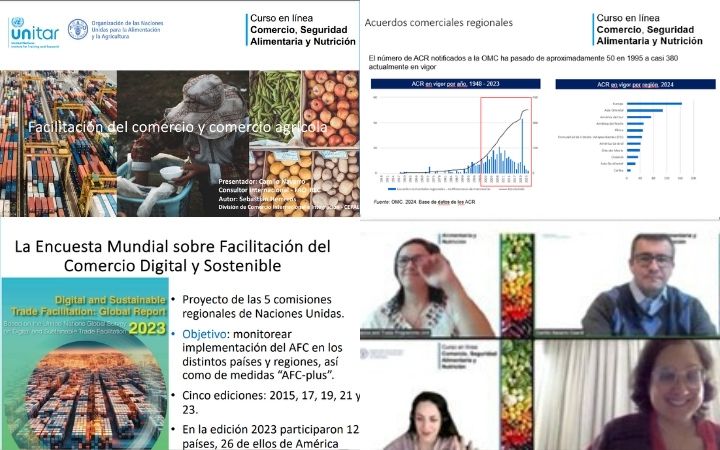- On 2 June 2024, UNITAR and FAO concluded the second edition of the “Trade, Food Security, and Nutrition” training course for Latin American countries.
- Sixty-three government officials completed the course, where they learned about the role of agricultural trade and how it can contribute to eradicating hunger, food insecurity and malnutrition in the region.
- The learners joined webinars, quizzes and discussion forums to broaden their understanding of trade policies and the challenges countries face in international trade negotiations.
- The training course ran from 6 May to 2 June 2024 and was conducted in Spanish.
24 September 2024, Geneva – On 2 June 2024, 63 government officials from Latin American countries completed the second edition of a specialized training course on trade, food security, and nutrition, conducted by the United Nations Institute for Training and Research (UNITAR) and the Food and Agriculture Organization of the United Nations (FAO). The course, delivered in Spanish, aimed to enhance the capacity of policymakers in the region to address the complex links between agricultural trade and food security.
The course provided insights into how agricultural trade can help eradicate hunger, food insecurity and malnutrition. Participants learned to navigate the challenges of ensuring that trade policies foster food security rather than undermine it, a key issue in international trade negotiations.
Drawing on FAO’s extensive expertise, the training focused on building the skills necessary for countries to design evidence-based trade policies, negotiate trade agreements and assess the impacts of trade on food security. Participants included officials from ministries of agriculture, commerce and industry, as well as private-sector representatives such as from agribusiness and trade associations.
High Demand and Positive Results
A total of 426 applicants from 23 countries applied for the course; 73 were selected to take the course, of whom 63 completed the programme. Notably, 67 per cent of participants were women, reflecting the course’s alignment with Sustainable Development Goal 5 “promoting gender equality and women’s empowerment”. The selection process prioritized professionals involved in regional, national and sectoral-level trade policymaking, ensuring that participants could directly apply the knowledge gained in their roles.
A post-course survey showed that 98 per cent of participants were fully or mostly satisfied with the course. Participants highlighted the value of the course’s webinars, quizzes and discussion forums, which facilitated knowledge exchange with peers across the region.
Participant Feedback and Impact
Several participants expressed how the course enhanced their understanding of food security and trade. One participant stated,
The course allowed me to broaden my basic knowledge of food security and nutrition, especially in areas underdeveloped in my country.”
Another participant noted,
The course helped me understand how Latin America compares to the rest of the world on food security and trade.”
Participants reported that they planned to apply their new skills, in coordinating with public entities, designing food security policies, disseminating information and contributing to national objectives. Another participant stated,
The knowledge gained allows me to consider internationalization strategies that can be shared with rural producers, enabling them to explore broader markets.”
2024 UNITAR-FAO “Trade, Food Security, and Nutrition” Training Course Description (Spanish Only)
About the FAO-UNITAR Partnership
The UNITAR-FAO partnership, established in 2010, has been instrumental in delivering high-quality training to strengthen the capacity of stakeholders in various fields. By leveraging FAO’s expertise and modern information and communication technologies, the collaboration has enabled a wide-reaching, cost-effective approach to knowledge transfer and skill-building in support of global development goals.
Read more FAO-UNITAR impact stories from Latin America and the Caribbean.
About UNITAR
The United Nations Institute for Training and Research (UNITAR) is a dedicated training arm of the United Nations founded in 1963. The Institute offers a wide range of training programmes and learning solutions to assist individuals and organizations in addressing global challenges. Find out more at www.unitar.org



